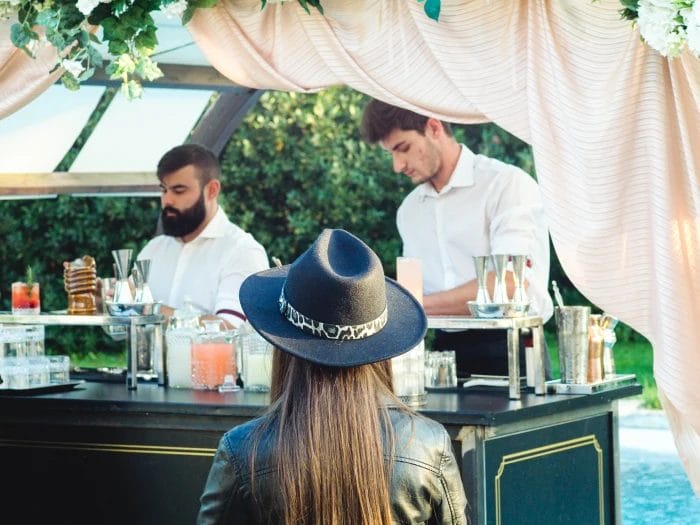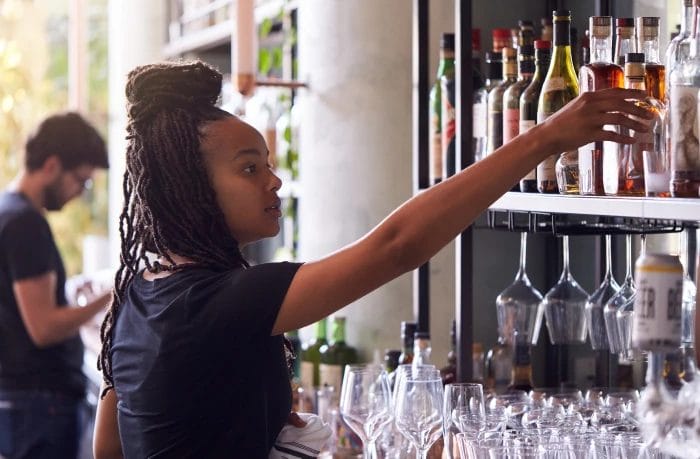Wanted:
First-class bartender for weekend and evening events. Must be knowledgeable, friendly, and fast. Enjoy perks like extra cash, travel, networking opportunities, and a flexible schedule.
Does this sound like you? Then freelance bartending may be the perfect fit!
The U.S. Bureau of Labor Statistics expects a 9% increase in demand for bartenders by 2032 and well over half a million working in the current market. It’s safe to say that bartenders are in high demand.
From the long list of benefits to what you need to get started, learn how to be a freelance bartender with these tips.
What Is a Freelance Bartender?
A freelance bartender travels to events and private parties instead of holding a permanent role at a bar or restaurant. They operate independently, typically by contract or through partnerships with venues and caterers, so most are self-employed.
Becoming a freelance bartender is a great way to make some extra money and dip your toe into the hospitality industry. Unlike full-time bartenders, who typically have to work their way up before they run the bar, freelancers can get their start with minimal experience.
This doesn’t mean that you should start booking gigs with zero know-how. You should still have some basic knowledge of mixology and drink service, but you don’t necessarily need to attend bartending school or have an extensive resume to start freelancing.

The Benefits of Being a Freelance Bartender
Have you worked in bars for years, but now you’re looking for some more flexibility? Or maybe you’re looking to dive into the event industry?
Wherever you are in your career, freelance bartending can be a sweet gig with these perks.
Flexibility and Autonomy
Self-employed bartenders get to set their own schedules. You’re free to take the jobs you want and turn down the ones you don’t. When and where you work is completely up to you.
Freelance bartending is ideal for:
- Full-time employees who want to supplement their income
- Caregivers responsible for children, elderly loved ones, or pets
- People who can’t work a traditional 9-to-5 or full-time job
- College students who attend class during the day
- Retirees who want to stay busy
- Night owls
Working as a freelance bartender allows you to earn money whether you’re looking for extra cash from a side hustle or only want a part-time job. It’s much easier to make it to doctor’s appointments, school events, and other daytime obligations when you can choose when and how you want to work.
Earning Potential
Freelance bartending is one of those unique jobs that gives back what you put into it. The more you work, the more money you’ll make.
Even if you can only manage a few nights a week, you have the potential to earn an excellent hourly rate. And in addition to your base rate, you can also earn tips, which can increase your earnings by 5–20%.
Event freelance bartender rates range from $30 to $60 per hour. This can depend on your experience, the size of the event, and where it’s located. Plus, if you operate independently, there’s no middleman when you freelance, so you keep all of the profits from your gigs.
You can also manage how much money you put back into your business. Use your existing equipment and restock supplies as necessary to maximize profit and minimize waste.
Pro Tip: If a client prefers that guests don’t tip, experts recommend increasing your overall rate by $1–$3 per guest.
Skill Development
If you want to develop and hone your skills, freelancing is a great way to do it. A freelance cocktail bartender can explore a wide range of drinks, setups, and client preferences since every event is different.
Working independently means you have the freedom to experiment with new recipes and techniques, improving your skills with each job. If you plan on moving into a full-time bartending career, this is a great way to build experience and expand your resume.
Career Advancement
Networking and building a reputation are the keys to success in this industry, and freelancing allows you to do just that. As you work more jobs and meet new people, you can find your niche, develop your specialty, and find new ways to set yourself apart from the competition.
You may find that you thrive as a wedding bartender or that you prefer to serve at corporate events. Maybe you have a knack for crafting unique or eye-catching cocktails that sell well in nightclubs and restaurants. You never know until you try!
Being a freelance bartender allows you to explore all of your options and find the right path to fulfill your career goals. Plus, you can start building connections as you book gigs and network with other professionals. This is beneficial whether you plan to keep freelancing or expand your business.
Travel Opportunities
One of the best things about being a freelance bartender is that your skills travel.
Going on a work trip for your day job? Try booking an event or two in a new town. Have a free weekend? Take a bartending gig for a destination wedding. Freelancing allows you to work when and where you want, so why not do it on a beach? Moving? No need to send out a thousand resumes — your skills go with you wherever you go.
If you love to travel, becoming a freelance bartender allows you to use your job experience wherever you are.

What You’ll Need to Become a Freelance Bartender
If this sounds like the ideal job, why not get started? You’ll just need to do some prep work before your first gig. These important steps will set you up for success in becoming a freelance bartender:
- Skills and training
- Equipment and supplies
- Business essentials
- Marketing
Skills and Training
While you don’t need years on the job to start freelancing, it does require some level of knowledge.
And if you’re fairly new to bartending, it’s important to understand your limitations. After all, you may be freelancing to gain experience! There’s no shame in learning as you go.
Just take care not to commit to jobs that you don’t have the training to fulfill. For example, if you only know how to pour beer and mix a few basic drinks, you may not want to take on a wedding reception where the bride and groom want to offer signature cocktails.
While you can do a lot of learning by doing, there are several ways you can gain core skills and training before you start booking gigs.
Bartending and Mixology
Knowledge of how to run a bar and mix drinks is the main thing you need to get started. You don’t have to be a master mixologist, but you should have the basics.
Key skills for freelance bartenders include:
- Tapping a keg
- Pouring beer
- Mixing the most popular cocktails
- Measuring liquor
- Basic technique (shaking, stirring, layering, etc.)
As you work more jobs and gain more experience, you can develop your skills, building up to more advanced cocktails and flashier techniques.
There are several ways you can gain real-world experience on your way to becoming a freelance bartender:
- Restaurants: You can learn a ton about bartending by working in the restaurant industry. You can observe the bartenders, learn drink recipes, and even help out during busy shifts.
- Barback: Barbacks play a critical role in supporting bartenders, stocking supplies, preparing garnishes, and keeping equipment clean. Many bartenders get their start as barbacks, learning practical skills while on the job.
- Event industry: Working for a catering company or venue allows you to experience firsthand how events are organized, workflow, and expectations.
- Friends’ parties: Volunteer to bartend for parties so you can practice mixing drinks and filling orders in a low-stakes environment.
- Bartending school: While it isn’t mandatory, many bartenders attend programs like BarSmarts to learn recipes, best practices, and legal requirements. While online courses are available, these do not offer the same level of practical training.
Once you have the basics, start building on your bartending skills as you complete more jobs and gain real-world experience.
Communication
Solid communication is the most important soft skill for a freelance bartender. You need to negotiate with clients, coordinate with venues, and chat with guests for every job you do. Moreover, you need to do all of this with a positive, friendly attitude.
To be successful, you need a toolbox of communication skills that go well beyond simply being well-spoken:
- Active listening
- Empathy
- Clear and concise language
- Conflict resolution
- Calm demeanor under pressure
- Understanding and anticipating customer needs
The best way to hone these skills is through experience. Even if good communication comes naturally to you, practice will help you cultivate your natural abilities.
Certifications
No matter where you are in your training journey, certification for safe alcohol service is a must. Online training options like TiPS or ServeSafe teach you how to serve alcohol safely and adhere to legal requirements. Not only do these courses make you better at your job — they also keep you compliant.
Some venues and event coordinators expect you to have certification before they’ll work with you. Plus, you may be required to complete a certification program to qualify for bartender insurance.
Since you’ll probably need a certification at some point in your freelance bartending career, it’s best to keep it up to date.

Equipment and Supplies
Every bartender needs some essential equipment to get the job done. What you keep in your freelance bartender kit depends on the types of services you provide.
You can keep your startup costs low by only getting necessities, like these:
- Strainer
- Shaker
- Muddler
- Bar spoon
- Jigger
- Citrus juicer
- Bottle opener
- Wine opener
- Knife
- Cutting board
As you gain experience, book more jobs, or expand your scope of services, you can add tools and upgrade your equipment.
For example, if you offer a full-service mobile bar, you’ll need some larger items, including:
- Portable bar
- Coolers
- Refrigeration
- Blender
- Coffee maker
- Ice maker
- Speed rail
- Glassware
Many clients or venues supply a functioning workspace and essentials like glassware and tools, but this can vary. Always check with your customers well in advance to ensure you’ll have the equipment you need to serve their event.
Unless they’re being supplied by your client, you’ll also need to have cocktail ingredients, like mixers and garnishes. It’s best to stock these on a case-by-case basis since fresh foods and juices can spoil between events. Purchase only what you need based on the number of guests and the drinks you expect to serve most.
The most popular cocktail ingredients include:
- Citrus, fruit, and vegetable juices
- Sour mix
- Bitters
- Grenadine
- Milk, half and half, or cream
- Club soda
- Sodas
- Lemons, limes, and oranges
- Maraschino cherries
- Olives
While some areas allow bartenders to bring their own liquor, the venue or host is often responsible for supplying the alcohol. Before you stock up on spirits, check your local laws to avoid a violation or confusion with your clients.
Finally, a uniform can make you appear more professional and polished. It doesn’t need to be fancy, in fact, the simpler the better. Black dress pants and a white button-up shirt always look nice and work well for just about any event you serve.
Business Essentials
Bar expert Jon Taffer once said, “Don’t open a bar if you think all you need to be is social and greet the customers. You have to run a business.”
No matter what industry you’re in, you need to manage the business side of your operations to ensure your success.
- Pick a name. To set up and promote your business, you need to give it a name. It should be easy for your audience to relate to and remember and be available — search the United States Patent and Trademark Office database to ensure your name isn’t already taken.
- Register your business. Once your business has a name, choose a business structure and register your business with your state agency.
- Get an EIN. Next, apply for an Employer Identification Number (EIN) so that you can open a bank account for your business and file taxes under your business name.
- Create a contract. Hire an attorney or use a standard bartending contract template to cover the services you’ll provide, your pricing, how long the event will last, the supplies you will provide, outline any client responsibilities, and any other important information.
- Get liquor liability insurance. Serving alcohol comes with plenty of potential risks that could cost you a whole lot of money. Bartenders can be held liable if they accidentally serve a minor or an intoxicated customer hurts somebody, but insurance can help absorb some or all of the cost.
Depending on where you live and work, you may also need to get a liquor license. Laws vary from state to state, so check with your local agency before scheduling jobs. Some areas require bartenders to have a liquor license, while others only allow venues and hosts to obtain licensing.
As you start working more, it can be difficult to manage everything on your own. Booking apps like Check Cherry or Wheelo make it easy to book gigs and keep your calendar organized.

Market Your Business
Finding clients can be challenging at first, but there are plenty of effective methods for spreading the word about your freelance cocktail bartender business.
Stock Up On Business Cards
You can pick up a box of business cards for less than the cost of a designer cocktail. Sites like Vistaprint feature plenty of customizable designs, materials, and finishes for you to choose from.
Once you have your cards, share them whenever you can, like:
- Leaving them with venues
- Exchanging them at networking events
- Offering them to new acquaintances
- Placing a stack on the bar when working
- Posting them on bulletin boards
- Giving some to friends or loved ones to pass out
Go Digital
According to a recent study, 98% of people search for local businesses online. Luckily, you don’t need to be an expert web designer to create a polished website and social media profiles.
Sites like Wix allow you to create a website at a minimal cost using artificial intelligence (AI). You can even purchase a unique domain name that matches your business name to make your site easier to find.
Your site should feature a few basic components:
- Images of your work
- Contact form
- Booking page
- Customer testimonials
You should also create social media accounts for your business. Use your business name as your handle and try to use the same one across all platforms. Join local groups where you can advertise your bartending business and reach a wider audience.
Network
If you want to work in your community, you need to get out there and meet people. Event coordinators, venues, and vendors often recommend fellow business owners to clients, which can lead to more jobs for you.
Check out these ideas for boosting your freelance bartending business through networking:
- Attend Chamber of Commerce meetings to mingle with other local business owners.
- Chat with event coordinators and venue owners (and make sure to leave your business card).
- Ask satisfied customers to recommend your services to their friends and colleagues.
- Get to know other vendors in the event industry, such as wedding planners, DJs, makeup artists, and caterers.
The more people you know, the more likely you are to book jobs through your connections and reputation.
Show Off Your Specialty
Don’t be afraid to put your talent to good use. If you have a knack for mixing spectacular cocktails or you have a few bartending tricks up your sleeve that wow your audience, showcase those skills on your site, social media, and advertising.
These are the things that will make you stand out above the competition.
If you’re an amazing mixologist, consider offering a specialty menu. You could create bespoke drinks for special events or holiday-themed cocktails to suit every season. Little extra touches like these are what will take your business to the next level with clients.
Crafting Your Career: Becoming a Freelance Bartender
Few jobs offer the flexibility, fun, and potential of freelance bartending. Hopefully, we’ve given you the jumpstart you need to dive into this exciting career path. With some basic skills and a willingness to learn, you can start your very own bartending business in no time.
FAQs About Freelance Bartending
Freelance bartenders typically charge between $30 to $60 per hour, plus earn anywhere from 5-20% more in tips.
Rates depend on your experience, the number of guests, how long the event will last, and the time of year. For example, a seasoned bartender may charge 30–50% more around the holidays.
Insurance Canopy’s Liquor Liability Insurance is designed to help reduce the cost of insurance claims that would otherwise financially devastate your business.
Freelance bartending allows you to create your own schedule, so you can work part- or full-time. The beauty of this job is that you can put as much or as little time into it as you can afford.
If you’re only able to work a few events per month, you can still operate a successful freelance business.
For extra cost, you can increase the coverage limits of your policies and include additional policies to your plan, such as professional liability, cyber liability, assault & battery coverage, and more.
Yes! Freelance bartenders need liquor liability insurance to protect them against common claims they may face.
If you overserve a guest or provide alcohol to an underage patron, you could be held legally and financially responsible if they hurt somebody or cause property damage. Insurance can cover some or all of these costs.
Getting started with Insurance Canopy is also easy, taking less than ten minutes to complete your application. More than anything, with Insurance Canopy you can create a financial safety net to protect your business and gain peace of mind that comes from having the protection you need.
- Overbooking your schedule
- Over- or undercharging for your services
- Offer complex cocktails
- Failing to check ID
- Rushing through orders
- Inaccurate measuring
Don’t overwhelm yourself with too many jobs or gigs that are beyond your abilities. As you gain more experience, you’ll be able to handle larger crowds and more complicated drinks.
Ranked #1 for Liquor Liability Insurance by Investopedia
- A+ rated, affordable coverage
- Flexible payment options
- $2,000,000 aggregate limits for general and liquor liability

